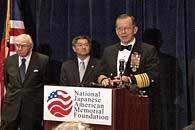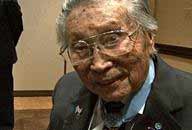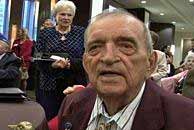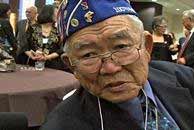In late October, 1944 the First Battalion of the U.S. 141st Infantry Regiment, comprised mostly of men from the Texas National Guard, broke through German lines in northeastern France and then found themselves cut off and surrounded by the enemy. They became known as "The Lost Battalion" and would have all died had it not been for the heroic rescue operation carried out by the mostly Japanese-American soldiers of the 442nd Regimental Combat Team. Around 40 aging veterans from both units came together in Houston on November 1st for what may be the last time.

The veterans, all in their 80's and 90's now, and their families came from all around the country for this 65th Anniversary event, sponsored by the National Japanese American Memorial Foundation. On hand to greet them was Chairman of the Joint Chiefs of Staff Admiral Mike Mullen, who posed for photos with each veteran and hailed their courage and their contribution to U.S. history.
"You represent such a special group of that very special generation and the courage, the valor, the heroism," said Admiral Mullen.

Among those present was 88-year-old George Sakato, who wore the Congressional Medal of Honor he was awarded for his part in the battle to rescue the trapped soldiers. He says he must have had ten lives to have survived the war.
"I have been blown up three or four times, three times, and I have been shot at I do not know how many times and then I had diphtheria, measles and pneumonia," said George Sakato.
Among the more than 200 men Sakato and his fellow soldiers helped rescue was Jack Wilson, who is now 85-years-old.
"If it had not been for them, I would not be here today," said Jack Wilson.

Wilson says the dedication of the Japanese American soldiers was all the more remarkable given the fact that they had left behind their families in internment camps where the U.S. government had placed them out of fear that they might help Japan.
"They put them in these internment camps," he said. "They lost their homes, a lot of them did. They lost everything they had but the clothes on their back."
Wilson says these men demonstrated their loyalty and their effectiveness as fighters.
"They had something to prove and they proved it," said Wilson. "They proved they were good Americans."
In 1988, the U.S. Congress passed a bill that provided reparations to Japanese Americans interned during the war. There is also a memorial dedicated to the patriotism and courage of the Japanse-American soldiers in Washington, DC.

But men like 85-year-old Don Seki, who lost an arm to a burst of machine-gun fire, plays down his own heroism in helping to rescue the "Lost Battalion."
"We had to do it," said Don Seki. "Somebody had to do it, so we went all out. That is our motto anyhow - shoot the works, go for broke."
Seki says that was a spirit inculcated in Japanese-American children by their parents.
"The way we were brought up, you cannot let your country down or your family down," he said.
Seki's 442nd Regimental Combat Team became the most decorated unit in US military history for its size and length of service. While their bodies have now become frail with age, they maintain that patriotic spirit and they never forget the men who were unable to come home.
diphtheria: an acute infectious disease caused by the bacillus Corynebacterium diphtheriae, characterized by the production of a systemic toxin and the formation of a false membrane on the lining of the mucous membrane of the throat and other respiratory passages, causing difficulty in breathing, high fever, and weakness 白喉
Related stories:
英国一战老兵成全球最长寿男性
揭秘二战传奇“熊大兵”:喜欢香烟和啤酒
World War Two victory celebrations
Veterans' Day(美国老兵纪念日)
(Source: VOA 英语点津编辑)